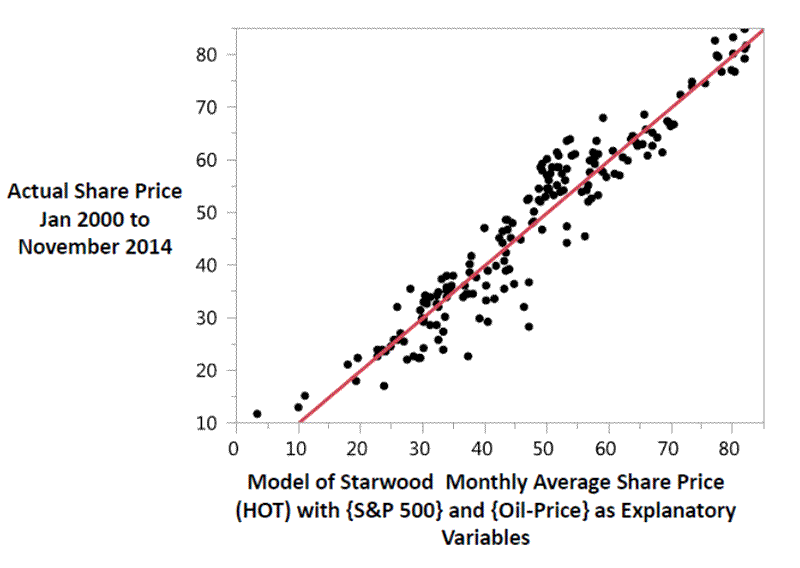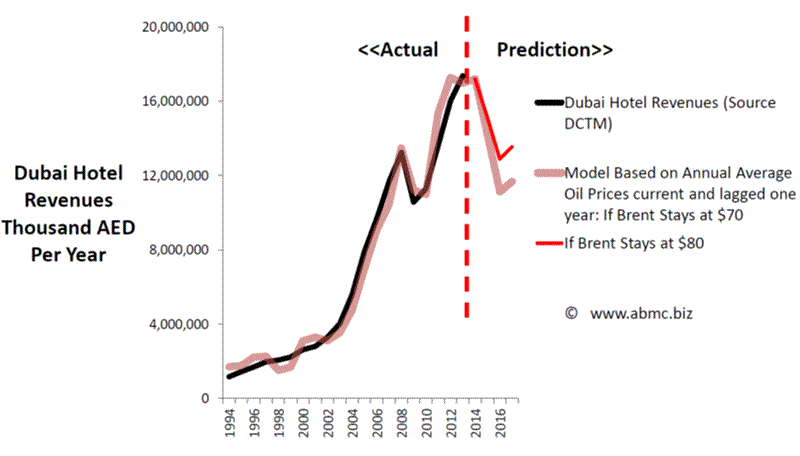Crude Oil Price Slump: 7% Hit for Global Hotel Stock Prices and 25% Hit for Dubai Hotel Revenues Is Predicted
Commodities / Crude Oil Dec 06, 2014 - 03:08 PM GMTBy: Andrew_Butter

 There is an increasing adjustment to the idea that the “totally unexpected” slump in oil prices to below $70 may prevail for some time.
There is an increasing adjustment to the idea that the “totally unexpected” slump in oil prices to below $70 may prevail for some time.
The model that predicted since 2011 Brent would, at some point, bottom at $67 which is just 3% below where it reached yesterday (not bad for a prediction made three years ago)... says the slump will last four years.
http://www.marketoracle.co.uk/Article47786.html
If the model that was 100% right in the past, continues to work...in the future, and there is indeed a four year slump...what is the likely effect on the tourism industry... supposedly the world’s largest industry?
This analysis looks at two timelines – (1) the stock price of Starwood Hotels (HOT) which is proposed as a marker for tourism worldwide, and (2) Dubai hotel revenues which represents a special case of tourism excellence and for quite a few years has been the fastest growing tourism destination in the world.
If you can build a model to explain the past, chances are the model can provide a basis for anticipating what might reasonably be expected to happen in the future. This is a model of the monthly average stock price of Starwood Hotels (HOT) since 2000 as a function of {Oil Price} and {S&P 500}

The model on just those two variables explains 95% of differences in stock prices and {Oil Price} explains 25% of the model (P<0.0001). Contrary to conventional wisdom, that’s a positive variable – in other words, historically, high oil prices appear to have been good for hotels.
The model says a drop in prices from $110 (Brent) to $70 will push the stock price down 7% below the reference point of tracking the S&P 500.
That suggests that any potential boost to tourism via lower aviation fuel costs will likely be more than offset by a decline in the number of fat-cats with petrodollars in their pockets buying a weekend break. In other words it looks like the main reason people go on holiday, and business/pleasure trips, is more to do with how much spare cash they got in their pockets, rather than the cost of aviation fuel; AND that the folks who benefitted from high oil prices had more cash in their pockets than other folk.
This is the model for Dubai:

The supply of hotel rooms (and services apartments) is not a statistically significant explanatory variable for revenues when tested along with {Oil Price} and {Oil Price Lagged One Year}. That says historically the market was and most probably will remain totally demand-driven, Dubai simply responded by building to meet demand.
Likely the reason for the remarkable correlation between oil revenues and Dubai Hotel Revenues is because 36% of guests come from either the region, or Russian-speaking countries, when petrodollars get scarce, those customers tend to stay home.
Likely the slump in hotel revenues will have a trickle-down impact on real estate prices, which are in any case quite dependent on oil-rich foreigners buying, as well as the general economic activity which is quite dependent on hotel revenues, as well as other oil-price related expenditure.
By Andrew Butter
Twenty years doing market analysis and valuations for investors in the Middle East, USA, and Europe. Ex-Toxic-Asset assembly-line worker; lives in Dubai.
© 2014 Copyright Andrew Butter- All Rights Reserved
Disclaimer: The above is a matter of opinion provided for general information purposes only and is not intended as investment advice. Information and analysis above are derived from sources and utilising methods believed to be reliable, but we cannot accept responsibility for any losses you may incur as a result of this analysis. Individuals should consult with their personal financial advisors.
Andrew Butter Archive |
© 2005-2022 http://www.MarketOracle.co.uk - The Market Oracle is a FREE Daily Financial Markets Analysis & Forecasting online publication.


